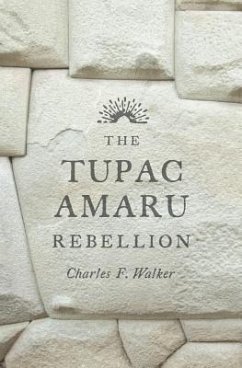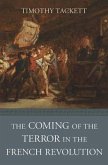Charles Walker examines the largest rebellion in the history of Spain's American empire, led by Latin America's most iconic revolutionary, Tupac Amaru, and his wife. It began in 1780 as a multiclass alliance against European-born usurpers but degenerated into a vicious caste war, leaving a legacy that still influences South American politics today.
[This is] the first extended survey of the causes and the course of the Tupac Amaru rebellion to appear in English since 1966... [It] is a lucid and accessible survey in which Walker skillfully blends narrative with explanation to construct a harrowing story of violence and atrocities on an enormous scale... [It] will give Anglophone readers a perceptive and reliable account of the terrible events that occurred far away from what they naturally regard as the principal center of action at that time, the British North American colonies, a mere 322,000 square miles in size, as compared with an Andean surface area approaching two million.
-- J. H. Elliott New York Review of Books
The Tupac Amaru rebellion began in the Spanish viceroyalty of Peru in 1780 and turned into the largest popular uprising in Spain's imperial history. To this day, its impact resonates in modern Latin American politics. The rebellion receives masterly treatment from Walker.
-- Tony Barber Financial Times
[This] is a coherent and thorough exploration of the causes, dynamics, and outcome of the insurgency. It sheds new light on many important topics and provides overarching interpretive frames... This book at least comes to attend to a very overdue and tangible need: a thoughtful, well-researched, and analytically sophisticated narrative of the most important indigenous insurrection in Andean history.
-- Sergio Serulnikov Hispanic American Historical Review
A solid new history of the Peruvian Indian revolutionary lays out the roots of his rebellion and its bitter legacy... A readable, not-too-scholarly story of a significant moment in South American history.
-- Kirkus Reviews
Walker argues convincingly that Tupac Amaru's wife, Micaela Bastidas, was his fierce, full partner and confidante, running the rebel camp, overseeing provisions, keeping discipline, and rooting out spies... It's an interesting and accessible treatment of Peru's infamously vicious conflict and of its leader, who became a potent symbol for indigenous rights throughout Latin America.
-- Publishers Weekly
The history of Spain's conquest and three-century grip on indigenous South America is rife with drama, but nowhere is that clash of cultures more vivid than in the story of Tupac Amaru II and his fierce, stubborn war for independence. Walker recreates the life of this remarkable eighteenth-century rebel with a bold sense of narrative and a careful eye for detail. Here is a fascinating study of the prevailing tensions of Tupac Amaru's time-between conqueror and conquered, white and brown, city and mountain, Old World and New World-that still vex South America today.
-- Marie Arana, author of Bolívar: American Liberator
A masterly and authoritative history of the rebellion. Walker's empathetic portraits of Tupac Amaru and Micaela Bastidas are nuanced and convincing, and his narrative account of the revolt is both elegantly and engagingly written. His book shows how and why the rebellion and its aftermath continue to reverberate in Andean society today.
-- Paulo Drinot, author of The Allure of Labor: Workers, Race, and the Making of the Peruvian State
The Tupac Amaru Rebellion was a pivotal event in the history of the Americas, yet narrating it clearly and judiciously has evaded generations of Andean historians. Charles Walker seems to have broken the curse, and I have no doubt that this excellent book will instantly become the standard account.
-- Kris Lane, author of Colour of Paradise: The Emerald in the Age of Gunpowder Empires
-- J. H. Elliott New York Review of Books
The Tupac Amaru rebellion began in the Spanish viceroyalty of Peru in 1780 and turned into the largest popular uprising in Spain's imperial history. To this day, its impact resonates in modern Latin American politics. The rebellion receives masterly treatment from Walker.
-- Tony Barber Financial Times
[This] is a coherent and thorough exploration of the causes, dynamics, and outcome of the insurgency. It sheds new light on many important topics and provides overarching interpretive frames... This book at least comes to attend to a very overdue and tangible need: a thoughtful, well-researched, and analytically sophisticated narrative of the most important indigenous insurrection in Andean history.
-- Sergio Serulnikov Hispanic American Historical Review
A solid new history of the Peruvian Indian revolutionary lays out the roots of his rebellion and its bitter legacy... A readable, not-too-scholarly story of a significant moment in South American history.
-- Kirkus Reviews
Walker argues convincingly that Tupac Amaru's wife, Micaela Bastidas, was his fierce, full partner and confidante, running the rebel camp, overseeing provisions, keeping discipline, and rooting out spies... It's an interesting and accessible treatment of Peru's infamously vicious conflict and of its leader, who became a potent symbol for indigenous rights throughout Latin America.
-- Publishers Weekly
The history of Spain's conquest and three-century grip on indigenous South America is rife with drama, but nowhere is that clash of cultures more vivid than in the story of Tupac Amaru II and his fierce, stubborn war for independence. Walker recreates the life of this remarkable eighteenth-century rebel with a bold sense of narrative and a careful eye for detail. Here is a fascinating study of the prevailing tensions of Tupac Amaru's time-between conqueror and conquered, white and brown, city and mountain, Old World and New World-that still vex South America today.
-- Marie Arana, author of Bolívar: American Liberator
A masterly and authoritative history of the rebellion. Walker's empathetic portraits of Tupac Amaru and Micaela Bastidas are nuanced and convincing, and his narrative account of the revolt is both elegantly and engagingly written. His book shows how and why the rebellion and its aftermath continue to reverberate in Andean society today.
-- Paulo Drinot, author of The Allure of Labor: Workers, Race, and the Making of the Peruvian State
The Tupac Amaru Rebellion was a pivotal event in the history of the Americas, yet narrating it clearly and judiciously has evaded generations of Andean historians. Charles Walker seems to have broken the curse, and I have no doubt that this excellent book will instantly become the standard account.
-- Kris Lane, author of Colour of Paradise: The Emerald in the Age of Gunpowder Empires







